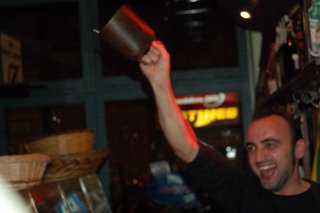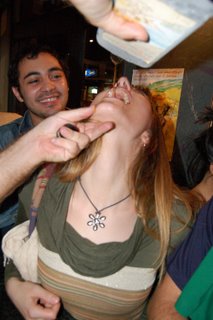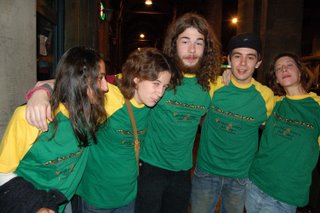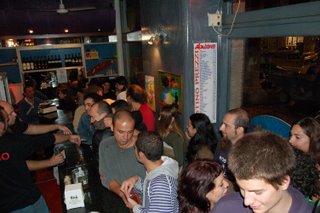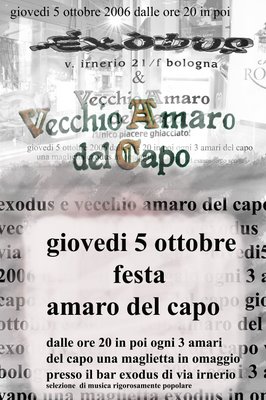Wednesday, December 06, 2006
Labels: scooter
aperitivo trash..
giovedi 14 dicemre dalle 19 in poi dj tommy di fano selezionerà musica esclusivamente trash non mancate
Tuesday, October 31, 2006
Monday, October 30, 2006
io pino...
Io Pino volevo cogliere l'occasione per ricordare che, il mio bar, che non è il cicchettaro pugliese, ma è , e ci tengo a precisarlo, il MIO EXODUS,è stato ripulito...No... che che avete capito!!!! quelli... quelkiii che mi pare chiamino punk.... ana... quelli li... quelli che corrono tutto il giorno intorno al cane... no, ... volevo dire quei gran bravi ragazzi che rompono... no... ho sbaglito di nuovo... dunque, quei cazzo di punk a bestia.... no, loro ci sono... belli, tranquilii, giocano, e si divertono con i cani, loro, solo loro si divertono, manc' i cani, tutto ok, al mio bar, e ricordo il MIO Bar, la pulizia fatta, è di altro tipo. AL mio BAr. un fottutissimo infame figlio di buona donna, perchè sicuramente l'ha messo al mondo per buone intenzioni, poi lui facendosi strada, finisce per fare pulizia all'exodus, così si fa il colpo della sua vita, perchè naturalmente l'exodus è tante persone quindi pieno di soldi, e quindi si sistema, la troia della sua ragazza, magari quella buona donna della madre...RIPRENDITI COMPA'!!! drogati di meno, lavora COMPA'!!! E se o tornavo indietro perchè volevo tornare, per esempio perchè avevo dimenticato i telefonini....? E per fortuna c'era un angelo che mi tratteneva... Chiara... Chiara sta cosa? Chiara ta cosa? E si... Se un c'era sto cazz i ancelo, io tornavo, trovavavo la luce delle scale accese, ti vedevo la con la tua fiammetta, la fiamma ossidrica?, come cazzo si mettava? E che fai? mi ammazi, ti ammazzo? che si fa?ue guaglio, ue riprenditi compa! prenditi una vacanza con i miei soldi, goditela, e magari la prossima volta chiedimeli, che magari te li do.Comunque va tutto bene, grazie di esistere Peter pan!.... (voce fuori campo):" E pecchè peter pan?" Pino:Pecchè rubbava ai richi per dare ai poveri!!!! (voce fuori campo) : " Era Robin Hood!!!!!".... Pino: a si va bhè!! questo però non lo scrivere
Wednesday, October 11, 2006
Wednesday, September 27, 2006
Wednesday, September 20, 2006
il parere di due simpaticissime giornaliste sulla "subcultura"
Subculture and Self
Navigating Alternativeness at Home and Abroad
by Emilie Sandoz and Sara Blumenstein
No self-respecting hipster or punk in America would ever be caught dead, I suppose the appropriate pun would be, in a place like Transylvania. Situated at the foot of Bologna’s main university street, via Zamboni, the city’s Goth club somehow managed to be both macabre and gimmicky. The basement tables were constructed of plastic skeletons in faux coffins and covered with a glass top, the beer taps had skulls on them, and heavy red velvet curtains hung in the main room. One night, on a lark, we went to hear a band called Muppet
Suicide. We realized once we got there that Muppet Suicide was a Guns N’ Roses cover band. Giggling nervously, we steeled ourselves for the performance as the concert venue filled up, people crowding against the fake gravestones that lined the walls. Looking back, Muppet Suicide’s performance was pretty unremarkable, except for their big hair and tight pants. What I found extraordinary was how engaged the Italians around us were in the performance. All sorts of people were having a great time, the pale, skinny kids with heavy eyeliner singing and dancing and giving rock salutes along with those wearing Jamaican stripes and Bob Marley t-shirts. I could only relate to the music in a really detached way; any actual delight that might have been had in Muppet Suicide’s performance was for me at least mitigated through many layers of kitsch and irony. For the Italians, though, it was just rock music. Something bizarre was happening here. The certain degree of detachment with which I approached the concert was absent in the people around me, for whom Muppet Suicide was merely another piece of the alternative counter-culture with which to align themselves.The self-consciousness of the American alternative scene and its complicated categories and sub-categories are subsumed in Italy by this giant hyper-category: someone is, simply, Alternativo. This concept is strange, if not ludicrous, to Americans, for whom the loaded word “Alternative” carries very specific connotations, reeking of 1995 and the word’s enigmatic appearance as a genre in countless Columbia House CD Club advertisements. Its overly broad significance renders it useless as a definition. Americans are Hipsters, or Punks, Goths, Metalheads, Furries. Or, more often,
they fit somewhere awkwardly in between. Counter-culture in Italy is instead, paradoxically, general. In Bologna, the country’s main university town, the character of the alternative youth, the young Italian rebelling against a bourgeois picture of life, often takes the appearance of the Punkabestia. Every night, I would leave my apartment and wander out onto Via Irnerio. I lived above Exodus, a bar filled on nights and weekends with Punkabestia. The literal translation of the Punkabestia pretty much defines the group: punk with beast. To be one you don’t necessarily need to own a dog, but you need to be comfortable around them. You also need to be comfortable with dog-related activities and side effects, like biting, dogfights, and urine. The Punkabestia routinely leaned against the columns of the portico outside my apartment drinking beers, playing instruments,
and getting in fights. The hordes of young men and women with matted hair, ripped t-shirts and dirty clothing would gather at the bar with their unneutered, bowlegged dogs (and a constant stream of puppies). The Punkabestia are exclusively composed of young people, in their teens to late twenties, but rarely (if ever) older than that. They live in a variety of locations and come from diverse economic backgrounds. Sometimes you’ll find them squatting across the train tracks in abandoned buildings, but often they are students, complete with apartments paid for by their parents above bars like Exodus, in other dusty corners of the city. Which is to say, the way that they live is a lifestyle choice. They define themselves by their situation in opposition to the rest of Bolognese society, their animals and clothing choices in clear rebellion to a town of traditional opulence (Bologna is one of the wealthiest cities in Italy, and houses a school-year student population rising to upwards of 100,000 during exam times). A Punkabestia’s appearance is easily recognizable, and thus so are their tendencies and habits. If you see a Punkabestia, you are supposed to know exactly where they are going and what they are all about. When, in early spring of this year, Bolognese officials passed a law prohibiting the sale of liquor past 9 PM and likewise restricted public consumption of alcohol, it was an action taken mainly (and overtly) to keep in check the rowdy Punkabestia invading the piazzas with 40s of Peroni during the increasingly warm nights. The enforcement of the law was restricted to the ancient city center where the alternative youth presence was most jarring and diffuse. No one had any doubts as to the group towards whom these limitations were primarily directed. A professor of mine mentioned her satisfaction regarding this turn of events. “I’m glad
they’re finally doing something about it,” she said, referencing the new law, “the Punkabestia are getting out of control.” The negative reaction to this ostensibly specific law was widespread. Posters were tacked up all over town and petitions collected thousands of signatures against the law at bars. The new law’s opponents didn’t see it merely as a civic ordinance; the language of the posters elevated it into conflict between two very different
visions of what sort of city center Bologna should have: a vibrant place full of loud, interesting people and their ideas or a museum for office workers and tourists. The breadth of the protest against the law showed the extent to which people identified themselves under the banner “Punkabestia,” and felt likewise placed in this category
by the Bolognese lawmakers, a consequence of the fact that the idea of being Alternativo was painted with such broad strokes. To claim this group as your own or to be placed in it meant simply that, in some way or another, you were not the norm. You lived a lifestyle that was opposed to that of the traditional Bolognese elite, and
however that became manifest in your clothing choices or brand of humor was irrelevant. Regardless, it fit you.
In America, we are hesitant to so blatantly put people, and to place ourselves, into categories. We do it, of course; we group one another and from that classification make assumptions. But the general paradigm that we adhere to dictates that individuals should be seen on their own terms. You should look at a person and be able
to see that person, your vision unclouded by social determinants of identity. That is, Americans belong to groups in a much more conditional way. These definitions are heavily tempered by our specific personalities and levels of engagement with them. We are individuals first, who then find our ways into particular social arrangements. For Italians, another paradigm seems to be at work. Italians appear to lack this self-consciousness for defining people by their groups, evident in their treatment of the Alternative and the Punkabestia. In Italy, personality and self possess an objectivity that they lack in the United States, or at least that we would pretend doesn’t exist. You define yourself first and foremost by the categories that envelop you, your individual self emerging from within their broad character suggestions. The sense of blatant stereotyping (“he is that way because he is from Bari, like everyone from Bari”) is strikingly absent from an acceptable vocabulary in America. To the reader, such a system of identity based on generalizations quite possibly sounds bizarre and unfair. But there remains something almost impressive about Italians in the ease with which they seem willing to assign and embrace certain labels. While the Italian system for expressing counter-culturalism might seem awkwardly broad, it was refreshing not to feel so hyper-conscious about the groups to which I belonged. In a world where all things “Alternative” were widely accepted by people who identified themselves under that umbrella (and without quotation marks), there wasn’t the intense internal questioning that is so integral to the work of American self-making. I didn’t feel like a tool for liking certain things. Listening to Phantom Planet or Muppet Suicide was not such a loaded question because I already fit somewhere; it was just a choice, a preference, not a sign of how
I identified myself or was identified. In America, and, I suppose, specifically at Chicago, I felt simultaneously pressured to be an individual and, at the same time, to conform to certain definitions of individuality. I suppose that this has been the lasting effect of my exposure to the Punkabestia counterculture in Bologna. Returning to
Chicago, I feel somehow more secure in myself. I view things that I like (music and movies that I love or hate, stores that I shop at, neighborhoods I frequent) more as preferences than as definitions. In the end, both paradigms have inherent flaws. Having tried to navigate both systems of self-making, and living now with some
synthesis of the two, has made me more aware of who, and not only what, I am.
Navigating Alternativeness at Home and Abroad
by Emilie Sandoz and Sara Blumenstein
No self-respecting hipster or punk in America would ever be caught dead, I suppose the appropriate pun would be, in a place like Transylvania. Situated at the foot of Bologna’s main university street, via Zamboni, the city’s Goth club somehow managed to be both macabre and gimmicky. The basement tables were constructed of plastic skeletons in faux coffins and covered with a glass top, the beer taps had skulls on them, and heavy red velvet curtains hung in the main room. One night, on a lark, we went to hear a band called Muppet
Suicide. We realized once we got there that Muppet Suicide was a Guns N’ Roses cover band. Giggling nervously, we steeled ourselves for the performance as the concert venue filled up, people crowding against the fake gravestones that lined the walls. Looking back, Muppet Suicide’s performance was pretty unremarkable, except for their big hair and tight pants. What I found extraordinary was how engaged the Italians around us were in the performance. All sorts of people were having a great time, the pale, skinny kids with heavy eyeliner singing and dancing and giving rock salutes along with those wearing Jamaican stripes and Bob Marley t-shirts. I could only relate to the music in a really detached way; any actual delight that might have been had in Muppet Suicide’s performance was for me at least mitigated through many layers of kitsch and irony. For the Italians, though, it was just rock music. Something bizarre was happening here. The certain degree of detachment with which I approached the concert was absent in the people around me, for whom Muppet Suicide was merely another piece of the alternative counter-culture with which to align themselves.The self-consciousness of the American alternative scene and its complicated categories and sub-categories are subsumed in Italy by this giant hyper-category: someone is, simply, Alternativo. This concept is strange, if not ludicrous, to Americans, for whom the loaded word “Alternative” carries very specific connotations, reeking of 1995 and the word’s enigmatic appearance as a genre in countless Columbia House CD Club advertisements. Its overly broad significance renders it useless as a definition. Americans are Hipsters, or Punks, Goths, Metalheads, Furries. Or, more often,
they fit somewhere awkwardly in between. Counter-culture in Italy is instead, paradoxically, general. In Bologna, the country’s main university town, the character of the alternative youth, the young Italian rebelling against a bourgeois picture of life, often takes the appearance of the Punkabestia. Every night, I would leave my apartment and wander out onto Via Irnerio. I lived above Exodus, a bar filled on nights and weekends with Punkabestia. The literal translation of the Punkabestia pretty much defines the group: punk with beast. To be one you don’t necessarily need to own a dog, but you need to be comfortable around them. You also need to be comfortable with dog-related activities and side effects, like biting, dogfights, and urine. The Punkabestia routinely leaned against the columns of the portico outside my apartment drinking beers, playing instruments,
and getting in fights. The hordes of young men and women with matted hair, ripped t-shirts and dirty clothing would gather at the bar with their unneutered, bowlegged dogs (and a constant stream of puppies). The Punkabestia are exclusively composed of young people, in their teens to late twenties, but rarely (if ever) older than that. They live in a variety of locations and come from diverse economic backgrounds. Sometimes you’ll find them squatting across the train tracks in abandoned buildings, but often they are students, complete with apartments paid for by their parents above bars like Exodus, in other dusty corners of the city. Which is to say, the way that they live is a lifestyle choice. They define themselves by their situation in opposition to the rest of Bolognese society, their animals and clothing choices in clear rebellion to a town of traditional opulence (Bologna is one of the wealthiest cities in Italy, and houses a school-year student population rising to upwards of 100,000 during exam times). A Punkabestia’s appearance is easily recognizable, and thus so are their tendencies and habits. If you see a Punkabestia, you are supposed to know exactly where they are going and what they are all about. When, in early spring of this year, Bolognese officials passed a law prohibiting the sale of liquor past 9 PM and likewise restricted public consumption of alcohol, it was an action taken mainly (and overtly) to keep in check the rowdy Punkabestia invading the piazzas with 40s of Peroni during the increasingly warm nights. The enforcement of the law was restricted to the ancient city center where the alternative youth presence was most jarring and diffuse. No one had any doubts as to the group towards whom these limitations were primarily directed. A professor of mine mentioned her satisfaction regarding this turn of events. “I’m glad
they’re finally doing something about it,” she said, referencing the new law, “the Punkabestia are getting out of control.” The negative reaction to this ostensibly specific law was widespread. Posters were tacked up all over town and petitions collected thousands of signatures against the law at bars. The new law’s opponents didn’t see it merely as a civic ordinance; the language of the posters elevated it into conflict between two very different
visions of what sort of city center Bologna should have: a vibrant place full of loud, interesting people and their ideas or a museum for office workers and tourists. The breadth of the protest against the law showed the extent to which people identified themselves under the banner “Punkabestia,” and felt likewise placed in this category
by the Bolognese lawmakers, a consequence of the fact that the idea of being Alternativo was painted with such broad strokes. To claim this group as your own or to be placed in it meant simply that, in some way or another, you were not the norm. You lived a lifestyle that was opposed to that of the traditional Bolognese elite, and
however that became manifest in your clothing choices or brand of humor was irrelevant. Regardless, it fit you.
In America, we are hesitant to so blatantly put people, and to place ourselves, into categories. We do it, of course; we group one another and from that classification make assumptions. But the general paradigm that we adhere to dictates that individuals should be seen on their own terms. You should look at a person and be able
to see that person, your vision unclouded by social determinants of identity. That is, Americans belong to groups in a much more conditional way. These definitions are heavily tempered by our specific personalities and levels of engagement with them. We are individuals first, who then find our ways into particular social arrangements. For Italians, another paradigm seems to be at work. Italians appear to lack this self-consciousness for defining people by their groups, evident in their treatment of the Alternative and the Punkabestia. In Italy, personality and self possess an objectivity that they lack in the United States, or at least that we would pretend doesn’t exist. You define yourself first and foremost by the categories that envelop you, your individual self emerging from within their broad character suggestions. The sense of blatant stereotyping (“he is that way because he is from Bari, like everyone from Bari”) is strikingly absent from an acceptable vocabulary in America. To the reader, such a system of identity based on generalizations quite possibly sounds bizarre and unfair. But there remains something almost impressive about Italians in the ease with which they seem willing to assign and embrace certain labels. While the Italian system for expressing counter-culturalism might seem awkwardly broad, it was refreshing not to feel so hyper-conscious about the groups to which I belonged. In a world where all things “Alternative” were widely accepted by people who identified themselves under that umbrella (and without quotation marks), there wasn’t the intense internal questioning that is so integral to the work of American self-making. I didn’t feel like a tool for liking certain things. Listening to Phantom Planet or Muppet Suicide was not such a loaded question because I already fit somewhere; it was just a choice, a preference, not a sign of how
I identified myself or was identified. In America, and, I suppose, specifically at Chicago, I felt simultaneously pressured to be an individual and, at the same time, to conform to certain definitions of individuality. I suppose that this has been the lasting effect of my exposure to the Punkabestia counterculture in Bologna. Returning to
Chicago, I feel somehow more secure in myself. I view things that I like (music and movies that I love or hate, stores that I shop at, neighborhoods I frequent) more as preferences than as definitions. In the end, both paradigms have inherent flaws. Having tried to navigate both systems of self-making, and living now with some
synthesis of the two, has made me more aware of who, and not only what, I am.
Monday, September 18, 2006
AIUTOOO....

cliccate su questo collegamento http://www.nonlosapevo.com e vedrete cosa è capace di fare una persona ad un altro essere vivente...e sconsigliato per i deboli di stomaco.quanta crudeltà, che mondo di mmerda...aiutooo..
Riccardo Orioles: tanto per abbaiare 7 agosto2000
- n.34________________________________________Exodus. La guerra e' appena finita e da un porto italiano un vecchio cargo, l'Exodus, prende faticosamente il mare. Non sono regolari ne' i documenti ne' il carico della nave. Quest'ultimo e' costituito da alcune centinaia di profughi ebrei, la maggior parte donne e bambini: sono sopravvissuti ai lager e alle persecuzioni, ma forse in Palestina - dove la nave in realta' e' diretta - potranno ricostruirsiun'esistenza. In Palestina governa ancora l'amministrazione colonialeinglese, che vieta tassativamente - per motivi politici -l'immigrazione: se un guardacoste dovesse incrociare l'Exodus,comandante ed equipaggio dovrebbero rispondere di gravi reati.La nave procede lentamente col suo carico di sconfitte e speranze e ilsole del Mediterraneo, un'alba e un tramonto dopo l'altro, scandiscedei giorni lunghissimi, in cui ogni momento puo' essere quello finale.Ogni tanto compare una sagoma all'orizzonte: le donne e i bambini sulponte corrono a nascondersi nella stiva e i marinai controllano che nonsia rimasto nulla in coperta che tradisca il carico di esseri umani. Sequella sagoma dovesse appruarsi d'un colpo e serrar le distanze,vorrebbe dire che e' una nave di sorveglianza, e che tutto e' finito. Ma ogni volta la sagoma lontana fila diritta per la sua rotta, e dopoun po' sparisce all'orizzonte.L'Exodus raggiunge - clandestinamente - le coste della Palestina e -clandestinamente - sbarca il suo carico di sopravvissuti. Sono i primimesi e anni dopo la guerra e anche in questi esseri umani c'e', come intutti, il senso che ora si ricomincia da capo, che forse nel tempo avenire il mondo - che chissa' perche' ci ha risparmiati - sara' piu'buono. Ma questo e' un altro discorso. Nella storia dell'Exodus, inogni caso, noi italiani figuriamo onorevolmente: ci sono italiani fragli organizzatori, sono italiani i capitani di porto che chiudono unocchio sui documenti fasulli e i marinai di guardia che "non siaccorgono" delle figure che s'arrampicano furtivamente di notte lungole scalette d'imbarco.La vecchia carretta, l'Exodus, e' stata smantellata all'arrivo. O,forse, ha continuato a navigare: cambiando nome ogni volta, per cercardi sfuggire ai registri dei vari governi. Adesso, io credo che il suonome sia Kalsit: cosi' almeno c'e' scritto a grosse lettere bianche la'a poppa, ma saremmo ingenui a credere che il porto di provenienza siadavvero quello scritto sotto, o che i documenti di bordo (in greco, inturco e - ci piacerebbe - anche in italiano) non siano contraffatti;chissa' quando denaro ci sara' voluto, o quanta pieta' forse, perfalsificare quelle carte. Il carico, e' quello di sempre:trecentocinquanta profughi, stavolta curdi, che sfuggono da ungenocidio in cerca di una terra in cui si viva.C'e' stato un incidente diplomatico, fra il governo italiano (stavolta,nel ruolo delle guardie) e quelli greco e turco (stavolta, nel ruolodegli italiani) che avrebbero chiuso un occhio sui documenti. La gentedi Crotone, in Calabria, ha accolto da meridionali i profughi: hannodato acqua e cibo, hanno scambiato parole.Dicono che nei suoi giri per l'Italia il presidente della Repubblica, che e' vecchio e ne ha viste tante, abbia di questi tempi una mania, quella di far suonare bandiere e sventolare inni. Ha perso una buona occasione. L'inno della povera Italia, quella che "chiudeva un occhio" sugli ebrei, sarebbe risuonato benissimo sul molo di Crotone ad accogliere l'Exodus che tornava in patria: il tempo di sbarcare *questi* profughi, di trovar loro una casa, di festeggiare i marinaiper il loro coraggio, e poi l'Exodus sarebbe ripartito - con chissa'quale nome stavolta: ma coi suoi bravi documenti falsi debitamentevistati dalle autorita' italiane - verso la sua ennesima ignotadestinazione.



3.jpg)







